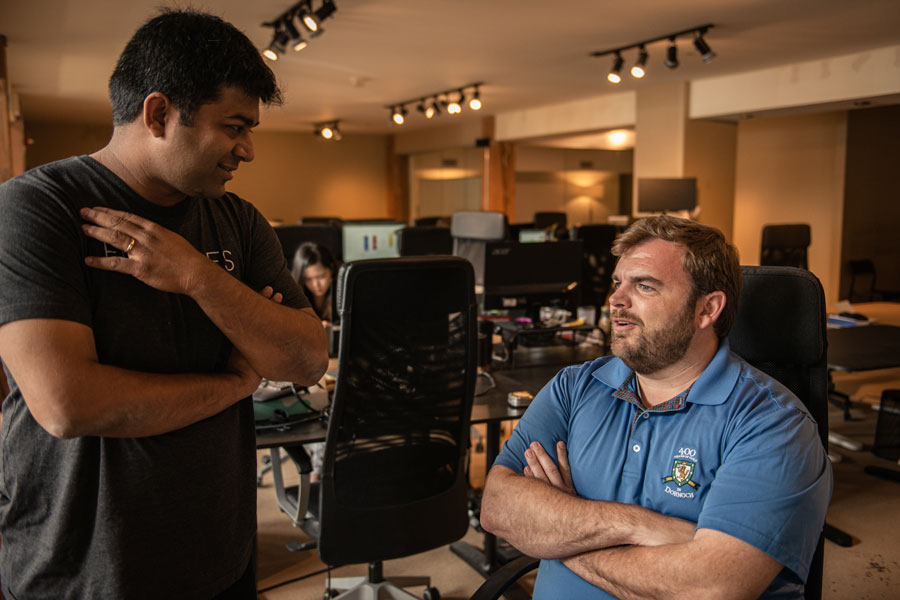Flyhomes, four years after starting at Kellogg, scales up with $141 million in financing
Flyhomes CEO Tushar Garg and VP of Operations Jonathan Paul. The four-year-old real estate startup has helped over 1,000 clients close on over $1 billion in homes.
November 26, 2019
On August 15, Flyhomes announced $141 million in new financing, a huge infusion of cash for the four-year-old real estate startup. At some companies, that might warrant a break or a few days of celebration.
Not so at Flyhomes.
“We are always running and we want to do something even bigger,” said Yikun Zhao, Flyhomes’ vice president of growth. “Because our pace is really fast, it’s more like, in the morning they announce that. And everyone is like super excited and happy, and then you just go back and jump in the work.”
Founded in 2015 by then-Kellogg School of Management students Tushar Garg and Stephen Lane, Flyhomes aims to streamline home buying into a cohesive, easy process. The funding round featured $21 million in Series B equity and $120 million in debt financing — a windfall that will enable expansion into new cities and boost product development.
Garg (Kellogg ’16) and Lane (Kellogg, Pritzker ’16) met at Kellogg in 2015 and took a New Venture Development class together. They were both entrepreneurship-minded and interested in creating a real estate brokerage that would bring transparency to the industry. But as they sold their first house and thought about their own home purchases, the two found what Garg called “a broken process” — a concerning situation for the biggest purchase in many people’s lives.
“As we went through this process we’re like, ‘Yeah, the home buying experience itself is not quite where it needs to be.’” said Garg, now CEO. “So then the journey became in terms of how do you improve the home buying process and make it much better for the customers? And honestly, that’s been the pursuit that we’ve been on.”
That pursuit quickly led to Zak Allen (McCormick ’16), who Lane found through Allen’s development portfolio. After starting out with Flyhomes part-time as a student, Allen chose to stick around in 2016, refusing an offer with Pandora and staying in Evanston.
Allen and Lane, now the executive chairman, worked long hours in The Garage that spring, building up the site from scratch mainly by themselves while the first customers started to buy in. The build continued that summer at 1871, a startup incubator in downtown Chicago.
“It was pretty crazy, honestly,” Allen said. “I was pretty much researching it as I went and doing basically heads down for ten to twelve hours a day just coding up this web application.”
Flyhomes went on to launch an engineering team in Seattle, and has since seen massive growth. The company functions in Seattle, the Bay Area, Portland and Boston, with around 150 employees. According to this summer’s news release, Flyhomes has “helped over 1,000 clients close on over $1 billion in homes bought and sold.”
The company is centered around three “superpowers” for its customers, tools that aid various facets of home buying.
The Guaranteed Offer backs a buyer’s offer on a home with a Flyhomes promise — the company will buy the house even if the customer can’t.
Flyhomes’ Cash Offer program similarly increases the confidence of the seller, making the buyer more competitive. The company closes on the house in cash and then sells to the buyer at the same price, allowing customers to take out mortgages but still bid with the weight of a cash offer.
Trade Up is the third Flyhomes initiative, and one that Garg is focused on scaling with the recent funding. Forty percent of Flyhomes customers are current homeowners, and Trade Up allows them to buy a new home before they move out of their old one. Flyhomes helps customers make a cash offer on the new home and then sells the exited house after the move. The company promises to buy the house themselves if it lasts 90 days on the market.
Flyhomes makes money just like a traditional brokerage, with commissions for buying and selling. However, in its effort to fully streamline the home buying and ownership experience, Flyhomes has opened up mortgage, closing and home improvement and repair subsidiaries. Zhao (School of Law ’16) calls this a “vertical” model, and wants to expand it to all Flyhomes’ markets.
Garg declined to speculate on a future valuation, but the new Boston and Portland markets are proof of scaling and expansion, and he said Flyhomes is hoping to build up momentum.
The CEO credits the early success to Northwestern’s support ecosystem of faculty and classmates, as well as to the lessons he learned at Kellogg about improving customers’ lives.
He said the rapid growth and the funding is humbling: “You find yourself pinching yourself to say, ‘Yup, this is real.”
“On one side it feels amazing and the other side you’re like, ‘Wow, there’s a lot more to go build,’” Garg said. “I’m keen to see what we will be doing in two to three years from now.”
An earlier version of this story incorrectly stated that Flyhomes will open up mortgage, closing and home improvement and repair subsidiaries. Mortgage and Title & Escrow are operational in all of Flyhomes’ markets. Flyhomes’ home improvement and repair subsidiary isn’t in every market, but it is operational. The Daily regrets the error.
Email: stephencouncil2022@u.northwestern.edu
Twitter: @stephencouncil


